- Home
- Paul Finch
Dark North Page 2
Dark North Read online
Page 2
“Only this afternoon, a legate arrived from Rome,” Lucius added. “He brought something that I think will reassure even the most anxious among you.”
He clapped hands, and another attendant scurried into the room, carrying a pole from which a great pennon hung: a pair of crossed black keys on a white weave. It was the papal gonfalon, and the other guests could only regard it blank-faced. Malconi glanced knowingly at his nephew, who visibly suppressed a smile.
“Caesar, I’m confused,” Consul Rascalon said. “Why do we need a military standard if we are only going to Britain on a diplomatic mission?”
“Because, my lords...” the Emperor replied, moving towards the curtain, “I’m not a fool. I’m fully aware that any negotiation with this self-proclaimed King of the Britons will prove to be a waste of time. It’s important that we at least go through the motions – certainly as far as the Holy Father is concerned – but we know what Arthur’s response will be. Therefore, this...” – he pulled a cord, which drew back the curtain on its brass runner – “...will be my response.”
They had all seen the Roman army marching before.
But never in darkness; never in complete silence.
At first it was difficult to work out what the immense mass of bodies snaking north along the highway actually signified. There was no fanfare of trumpets, no banging of drums or cymbals. But at length they made out moonlight glinting on helmets, and the tips of spears, and the heavy overlapping plates of the legionaries’ body armour, as they trundled past the palace in rank after rank, cohort after cohort, legion after legion.
It was anyone’s guess how long they had been marching for – hours maybe, and still there was no end of them in sight. Little wonder that Emperor Lucius’s normal mask of rational affability briefly slipped, revealing an expression of fierce, almost deranged joy.
“As my official ambassadors, gentlemen, you will carry no banners to Britain; neither papal, nor Imperial. But in due course, these fellows will.”
One
“THE PENHARROW WORM, O God!” the vagrant priest cried by the roadside. “Spare us the Penharrow Worm! It terrorises our land. O Lord in Heaven... grant Earl Lucan the strength to bring us its head!”
“The ‘Penharrow Worm,’” Lucan said, frowning down from the gatehouse battlements. “They make it sound like a dragon, yet it’s only taken sheep and goats.”
“The villagers are frightened,” Turold replied. He was seated in one of the embrasures, strumming on his lute. “They fear for their children.”
“As lord of these lands, I suppose it’s my duty. But I wouldn’t have called this hunt today were it not for Alaric’s birthday.”
“I’m sure he’s grateful, but he’d be more grateful to be knighted.”
“Everything in the right time, Turold.” Lucan pulled on his leather gauntlets and strode to the top of the ladder.
Earl Lucan, marcher-baron of this region and Steward of the North, was an imposing figure, taller than most men, broad-shouldered and barrel-chested, but also craggy-faced and scarred; a testimony to his many years in the King’s service. He had a shock of unruly black hair, which even though he’d seen nearly forty winters, was not yet shot with silver. His eyes were grey-blue, and capable of an icy, penetrating stare which could put the hardiest opponent on edge.
Below them, the hunting party trickled through the gatehouse onto the open ground in front of the castle. There was much noise and ribaldry. Like Lucan and Turold, the earl’s retainers were clad for holiday rather than war, in cloaks and tunics, all brightly coloured and richly embroidered. Lucan himself sported a pale green pelisson and a darker green shoulder-cape, complete with hood and square-cut scallops. Turold, his banneret,5 and a much slighter figure with long golden locks and almost girlish good looks, affected a more fashionable thigh-length gypon and hose, quartered in Harlequin style, pearl-blue alternating with peach-yellow.6
They were greeted at the foot of the gatehouse stair by Wulfstan, a hardened oldster with a bald head and thick white beard. Lucan’s chief scout and tracker, Wulfstan was clad more practically in cross-strapped breeches and a heavy sheepskin doublet. He had three grooms with him, and a trio of destriers in readiness, each noble brute loaded with spears, hunting-bows, and quivers of fresh-fletched arrows.
Lucan had sixty other household knights aside from Wulfstan and Turold, and each one held at least one squire in training. Those who weren’t already mounted up were hastening to do so, all the while boasting and mocking each other. In addition to these, many of the earl’s tenant knights, with their own manor houses and retainers on his estates, had arrived; rather than wait outside, a number of them had ridden straight into the castle to greet old friends, swelling the disorder. Hounds yapped frenziedly; pages and servants scampered back and forth with sacks of food and skins of wine.
Wulfstan eyed the scene with weary resignation. “I thought we were only celebrating Alaric’s birthday tonight? Most of these fools are at the feast already.”
“Let them enjoy their sport while they can,” Lucan said. “It won’t be as much fun when they’re out in the woods.”
Bows were flexed and hunting-horns put to the test. Turold slung his lute over his back, swept off his feathered hat, leaned from the saddle and grabbed a buxom serving lass, giving her a kiss. “The sight of you is more bewitching than any basilisk’s gaze, my love,” he laughed.
She hurried away, scarlet-cheeked.
It seemed that little order could be brought from the chaos. But when Lucan mounted up and galloped beneath the portcullis, there was a race by the merry company to follow.
Their laughter echoed around the great bastion that was Penharrow Castle.
Penharrow – a name to stir relief in some, fear in others, awe in all.
It stood on a ridge at the head of a valley filled with wild, rugged forest, which, this being only the first day of spring, was still shrouded in spectral mist. On all sides, the valley was cradled by mountains, their snow-capped peaks scraping a sky as blue as cut steel. It made a majestic setting, yet Penharrow Castle was a cruel edifice: a bleak, oppressive stronghold, towering tier upon tier. Though many handsome, heraldic pennons fluttered from its towers and parapets – Lucan’s own black wolf, King Arthur’s red dragon, and the many hawks, bears and leopards of the household men – its outer walls were built from crude, cemented stone, sheer and unbroken, save for the occasional cruciform arrow-slit.
The track that wound down from the castle was lined with village folk, who cheered to see their overlord riding to do battle with the enemy that had tormented them. The vagrant priest – one of many of his kind who wandered the roads of Arthur’s realm, commanding penitence and calling doom on evil-doers – was standing on an upturned pail. He wore a sackcloth robe tied at the waist with a knotted rope. His bare feet were cut and dirty, his beard unkempt; his matted hair straggled down either side of a thin weasel-face. He held aloft a crucifix.
“Praise God for Earl Lucan,” he called, “whose wrath the foul serpent shall taste!”
Further down the road, beyond the bridge over Wintering Beck, Lucan’s own chaplain, Father Belisarius, stood beneath a yew tree, his two altar servers flanking him. Compared with the vagrant, he was resplendent in a hooded black habit, snow-white tabard and matching gauntlets. He, too, was praying, incanting in Latin, incense smoke curling from his thurible. A few yards on, Lucan’s wife, Countess Trelawna, and five of her ladies were seated side-saddle on their palfreys. As it was a cold day they wore woollen gloves, taffeta cloaks over their tightly-fitted kirtles, and wimples and veils tied in place with bands of silk. Countess Trelawna was eight years younger than her husband, but now in the full flower of womanhood. Her hair was honeyed gold, and, when uncoiled, descended in tresses to her slender waist. Hers was a serene kind of beauty, very gentle, very childlike. Her nose was slightly upturned in a fetching elfin way, her lips full but soft. Her eyes were as blue as her husband’s, yet infinitely kinder.
As Lucan rode by, their gazes met, and she smiled in her distant, wistful manner. Her ladies were more demonstrative. Those knights who weren’t married would gallivant up to them in search of favours, which, in honour of the day, they were showered with.
“I suspect the countess fears for your safety, my lord,” Turold said, a little embarrassed, as always, by his chatelaine’s coolness to her husband.
Lucan was unmoved. “She needn’t. Were I worried, I’d have called the host for battle.”
“Loving wives rarely see such reality. Not when their husband’s safety is at stake.”
“Aye,” Lucan grunted. “So I’ve heard.”
He drew the broadsword from his hip and transferred it to the scabbard on his saddle, then kicked his horse forward, riding to catch up with those leading the hunt, many of whom were already spreading out into the wildwood. The gamekeepers beat their drums and blew their horns, spreading out in a line, the hounds gambolling ahead of them. Riding just behind them were Lucan’s squire, Alaric, and his two closest companions, Benedict and Malvolio, respectively Turold’s and Wulfstan’s squires.
At eighteen, Alaric was the oldest and most serious-minded of the three. He was tall and spare of limb, but after his years of knightly training, had developed a strong, wedge-shaped body. He kept his brown hair short and his face clean of bristles. He was a fresh-faced lad, not exactly handsome, but for all his youth there was a manliness about him, which the local village girls had noticed. At sixteen and fifteen, Benedict and Malvolio were boys in comparison, the former thin and rangy but clean and handsome of aspect, the latter short and dumpy and somewhat less appealing. They wore their hair long but cut square at the shoulder as was the fashion at Court.
“YOU UNDERSTAND, ALARIC?” Malvolio chided him. “In these days of peace, there’s no call for knights. If Earl Lucan were to knight you, it would cost him dear. A horse to call your own, an equestrian seal, full armour, full weaponry, a bed in the knights’ hall. Why make such expense when all you’d be doing is exactly what you do now – loafing about the castle? Surely it would be more cost-effective to leave things as they are?”
“Alas, it’s true,” Benedict said. “The only time a knight is needed is when he must die heroically in battle. Isn’t much of a life we’ve chosen for ourselves.”
“It isn’t much of a life Alaric has chosen,” Malvolio said. “How often has he made that tiresome trip to Camelot, and had to stand in the ante-hall while his master is honoured at the Round Table... and yet here he is, unfit even for his master’s table?”
Alaric smiled. It wouldn’t be a normal day if they didn’t rile him, though there was often some truth in their jest. For all his success in the tourney – and Alaric had proved himself many times with sword and lance in sport – he knew his master believed that only war could test a man’s true mettle. And Alaric had never yet fought in one. The last major crisis to afflict the kingdom had occurred when a vast horde of Danes had invaded along the River Humber. Arthur had triumphed, though it had seen a terrible slaughter on both sides. By nightfall, the crows were picking at five Danish kings, along with eight Knights of the Round Table, and maybe thirty thousand other men and ranks. Earl’s Lucan’s left eyebrow was still bisected by a hard, white scar where a Danish war-axe had cloven his helm.
But that had been a decade ago, when Alaric was still a lad. With so many widows and orphans made, it seemed wrong to wish for such perils to revisit the kingdom purely so that he might benefit. Instead, Alaric had hoped that with the advent of his eighteenth birthday, Earl Lucan might make an exception to his normal rule, but it seemed not.
He attempted to laugh. “At least I get a hunt to celebrate my coming of age.”
“Aye,” Malvolio agreed. “The Penharrow Worm would have been allowed to slither across the land, ravaging every farmstead, if it hadn’t been for your birthday. The good people of the North owe you a boon for being born on the first day of March.”
A call went up from along the line. The three squires steered their horses towards the call, ducking under low boughs, wading to the fetlocks through clumps of dew-soaked bracken. When they arrived, the earl’s keepers were leaning on their quarterstaffs. In their midst, a foul fetor rose from a pile of fleshy organs and glistening, semi-liquid pulp. Splintered bones and cartilage were visible, woven into the mess along with scraps of black and white hide. A single hoof jutted out on a slender, fleshless shank.
One by one, the rest of the hunt gathered. At last, the men stood aside to allow Earl Lucan to dismount. He stood in silence, regarding the obscenity. When Wulfstan arrived, he sank to his haunches for several long moments, before standing up and searching the surrounding area. The circle of spectators widened to accommodate him.
At last he came back. “This is what it does, my lord – regurgitates its food.”
“Regurgitates?” Lucan said.
There were grave mutters. The atmosphere of gaiety had diminished somewhat.
Wulfstan scratched his beard. “Evidently, it swallows its prey whole... but it would take a long while to fully digest a beast of this size. It would become sluggish and might even curl up and sleep, which would leave it vulnerable out here in the open. So it absorbs what it can, and then, as I say, vomits up the remains and continues on its way.”
Silence filled the glade. Men cast nervy glances over their shoulders.
“How long since it was here?” Lucan asked.
Wulfstan probed the rubble with his finger. “There’s more than a whiff of decay. I’d say a day, maybe a day and a half.”
“Plenty of time for it to re-ensconce itself.”
Wulfstan nodded grimly.
“Can you track it?”
“Yes, my lord. Now that we have a starting point. The last place it attacked was the hamlet at Hubblewell. That means it’s heading due northeast... for the Flint Axes.
“Over the last few weeks livestock was destroyed at Godhall, Langbourne and Wathby. Those are also within easy striking range of the Axes.”
“You’re thinking what I’m thinking?” Lucan said.
“I believe so, my lord. It’s using Dungeon Ghyll as its lair.”
There were sharp intakes of breath among the knights.
The borderland between Arthur’s kingdom and the pagan realm of Rheged was mainly wilderness. From Penharrow to Hadrian’s Wall, from Carlisle to Durham, it consisted almost entirely of trackless moor, foggy mountain and fathomless wood. There were many ways for an unwary traveller to die out here, but there were also places that even local folk would avoid – places like Dungeon Ghyll.
It was a geographical oddity even in this land of extremes: a labyrinth of crags, defiles and deep, water-filled caverns, covering about six square miles. It was much overgrown with trees and vegetation, many of its channels so narrow and so thick with undergrowth that they were almost impassable. It occupied high ground at the far northern end of Penharrow Vale, and was accessible in various ways, though on the south it was bordered by the so-called ‘Flint Axes,’ a row of three towering rock forms shaped like the blades of axe-heads.
“Very well.” Lucan swung up into the saddle. “This changes things. We advance to the Ghyll, but there are many paths through it, and we need to cover them all. So we divide into separate groups when we arrive there. No party is to have less than five men.”
There were muted protests from some of his knights, who, though they weren’t girt for war, were still affronted by the suggestion that this monster might be too much for them. Lucan called them to silence, pointing at the mass of festering offal.
“This was once a full-grown cow. Up to now we’ve been told only of sheep and goats, but clearly that was wrong. No group is to consist of less than five men. You people on foot...” He turned not just to his beaters and keepers, but to the villagers and foresters who’d followed with bills and reaping hooks. “None of you are to enter the Ghyll. Instead, blockade as many of its exits as you can find. And no noise from this
point. We aren’t going to frighten this creature out into the open, so we’ve a better chance coming on it unawares. From here on, we keep the pack to the rear.”
They proceeded more stealthily. The mist seemed to thicken, and icy dew dripped from the interlaced branches overhead. Within an hour they’d reached the Flint Axes, which towered over the treetops as they approached. All joy of the hunt had fled. Every man felt a discomfiting distance from home. In silence, they formed their separate groups.
There were various ways to enter the Ghyll, either through low clefts or high passes. Two routes led through the Axes themselves, parallel passages cluttered with scree. It was one of these that Lucan opted for, now in company with Turold, Benedict and two other knights.
“Good luck, everyone,” Lucan said, as they went their separate ways.
He and his party filed through one tight, V-shaped valley. In some parts it was barren, in others thick with thorns. There was silence, save for the cawing of crows or the skittering of pebbles dislodged from on high. Their eyes roved in every direction. Veils of mist continued to pass over them.
The same experience was shared one valley over by Wulfstan, Alaric, Malvolio and two other house-men. Their path descended deeply. Grykes appeared to either side: yawning fractures in the cliff-sides, from below which they heard an immense churning of water. What few trees there were, were bent and gnarled. Underfoot, a shifting moraine could snag a hoof or snap an ankle, and indeed, when an eagle screeched as it lofted overhead, Alaric’s mount panicked and turned sharply, from which point it developed a limp. Examination revealed that it had thrown a shoe.
“You’ll have to proceed on foot,” Wulfstan said, in the tone of irritation he used with all the squires. “Either that or go back.”

 Stolen
Stolen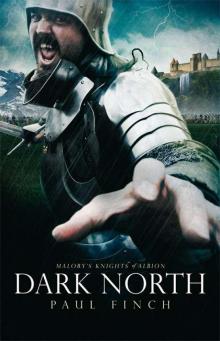 Dark North mkoa-3
Dark North mkoa-3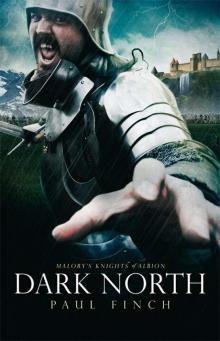 Dark North (Malory's Knights of Albion)
Dark North (Malory's Knights of Albion)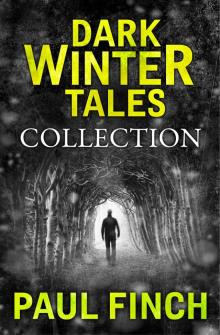 a collection of horror short stories
a collection of horror short stories Sacrifice
Sacrifice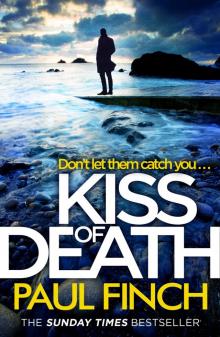 Kiss of Death
Kiss of Death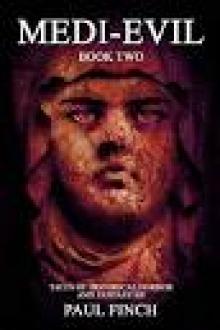 Medi-Evil 2
Medi-Evil 2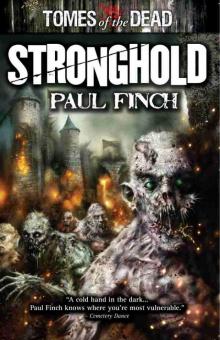 Stronghold
Stronghold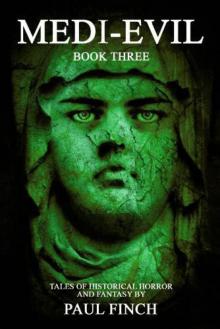 Medi-Evil 3
Medi-Evil 3 Dead Man Walking
Dead Man Walking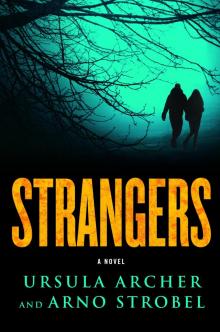 Strangers
Strangers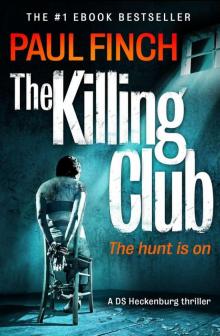 The Killing Club
The Killing Club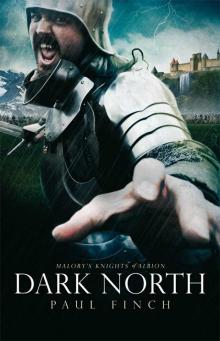 Dark North
Dark North A Wanted Man
A Wanted Man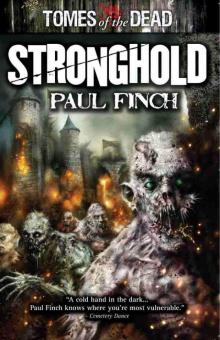 Stronghold (tomes of the dead)
Stronghold (tomes of the dead) Hunted
Hunted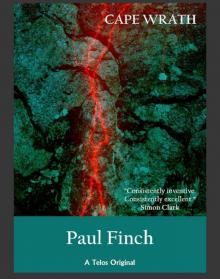 Cape Wrath
Cape Wrath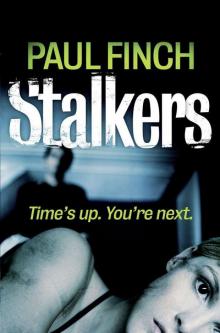 Stalkers
Stalkers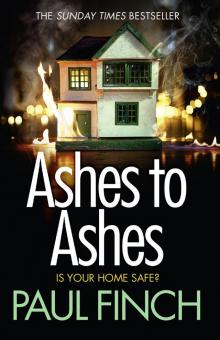 The Burning Man
The Burning Man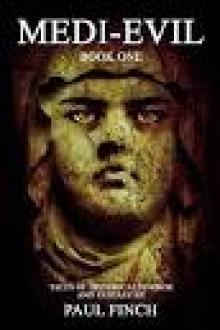 Medi-Evil 1
Medi-Evil 1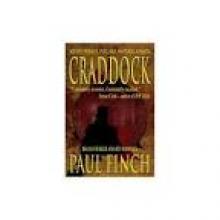 Craddock
Craddock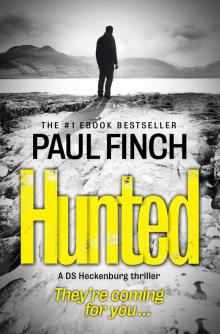 Hunted (Detective Mark Heckenburg Book 5)
Hunted (Detective Mark Heckenburg Book 5)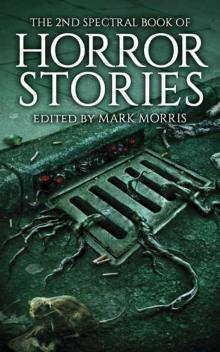 2nd Spectral Book of Horror Stories
2nd Spectral Book of Horror Stories The Chase
The Chase